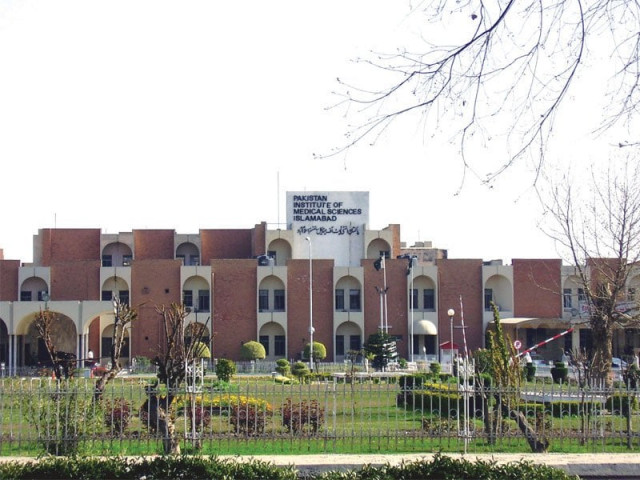After snakebite victim dies: Enraged attendants block PIMS emergency ward
Hospital denies family’s claim of ignoring victim, states victim was brought <br /> too late to save

Pakistan Institute of Medical Sciences in Islamabad, Pakistan. PHOTO: EXPRESS
Hospital officials, though, claim that the patient was brought to the facility at a very advanced stage and could not be saved despite administering anti-venom serums.
According to the family, 18-year-old Talha Abbasi had been bitten by a snake at around 7pm on Saturday evening.
fatal disease: PIMS gets Congo fever patient
A resident of Tarlai area of Islamabad, he was rushed to the Pakistan Institute of Medical Sciences (Pims) an hour later at around 8pm for treatment. But just two-and-a-half-hours later, he died.
Abbasi’s family alleged that the youngster was not given the care he deserved.
“Neither Rescue 15 nor the hospital staff cooperated with us,” claimed Abbasi’s grieving father.
“My son was in pain for over two hours but no one treated him,” he went on to claim, adding that during this time he kept visiting the room of the emergency ward in-charge and other doctors but they did nothing even as Abbasi continued to slip.
Abbasi’s cousin said that doctors had collected blood samples from the patient and allegedly said that they would start treatment once the results were back.
If this is happening in a tertiary care hospital under the nose of the federal government, what will be happening in far-flung areas,” the family exclaimed.
Infuriated over the lack of immediate response from the healthcare staff and then their apathetic attitude, Abbasi’s family blocked the hospital’s emergency ward for over two hours.
A scuffle between the attendants and the hospital staff was also reported.
It finally took intervention from the police and assurances from Assistant Commissioner Malik Waseem for Abbasi’s attendants to reopen the doors of the emergency ward.
Later, in an application submitted to the police, Abbasi’s father nominated two Pims doctors, including a lady doctor, and the in-charge of the emergency ward as the ones responsible for his son’s death.
Meanwhile, the hospital’s administration has maintained that doctors on duty provided all possible treatment to Abbasi and did their best to save his life.
“Actually, the patient arrived late in the hospital and the venom had already spread throughout his body,” Pims Executive Director Amjad Mehmood said.
He was not breathing when he was brought in and doctors tried to revive him, Dr Mehmood said, adding that an anti-venom serum was also administered to the patient.
“It has become a trend to pressure the healthcare staff whenever a patient dies,” the Pims executive director said, adding that they have nevertheless ordered an inquiry into the incident.
“If any negligence is found on the part of the doctors, they would be punished,” he maintained.
Anti-venom stocks
The National Institute of Health (NIH) is the sole producer of anti-venom serum. However, it only manages to fulfil around 25 per cent need of the country. The gap is filled by procuring anti-venom internationally, including from India.
Health minister concerned over lack of facilities at PIMS
Dr Mumtaz Ali Khan, a senior scientific officer at the NIH, explained that the serum produced by the institute is easily available at public sector hospitals In Islamabad. The serum is also provided to other provincial hospitals on demand.
Explaining how the serum works, he said that a snakebite patient is injected as many as six vials and that it could take hours for it to work.
Around 95 per cent of snakes are not poisonous, he said, adding that in the event a patient is bitten by a poisonous snake, they should be injected with the anti-venom serum as soon as possible, but only after the patient’s condition has been stabilised.
In hemotoxic venom, which attacks the heart and the cardiovascular system of the body, Dr Mumtaz said that doctors have some time to treat the patient. However, in the case of neurotoxic venom — which attacks the brain or the nervous system of the body with no bleeding — the venom is fast-acting and provides little time for treatment.
Usually, the cobras, mambas, coral and sea snakes have neurotoxic venom while vipers and pit vipers have hemotoxic venom.
Published in The Express Tribune, September 3rd, 2018.



















COMMENTS
Comments are moderated and generally will be posted if they are on-topic and not abusive.
For more information, please see our Comments FAQ